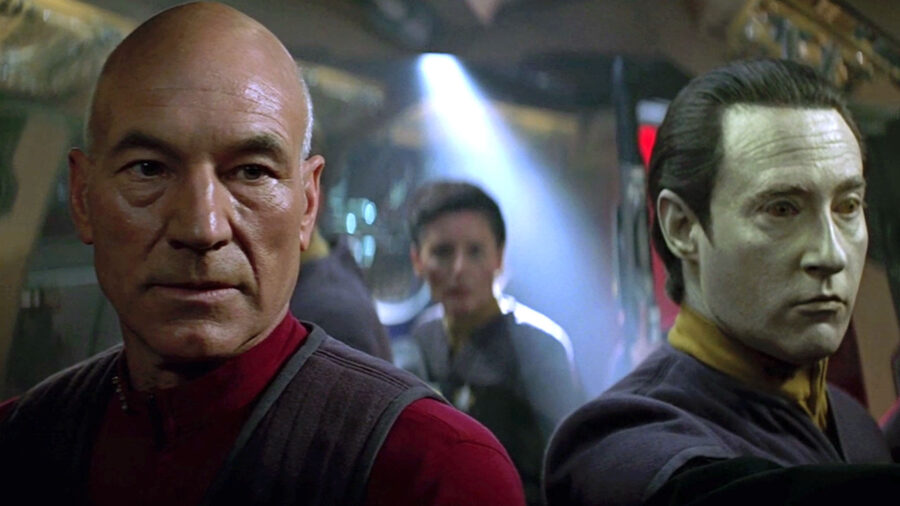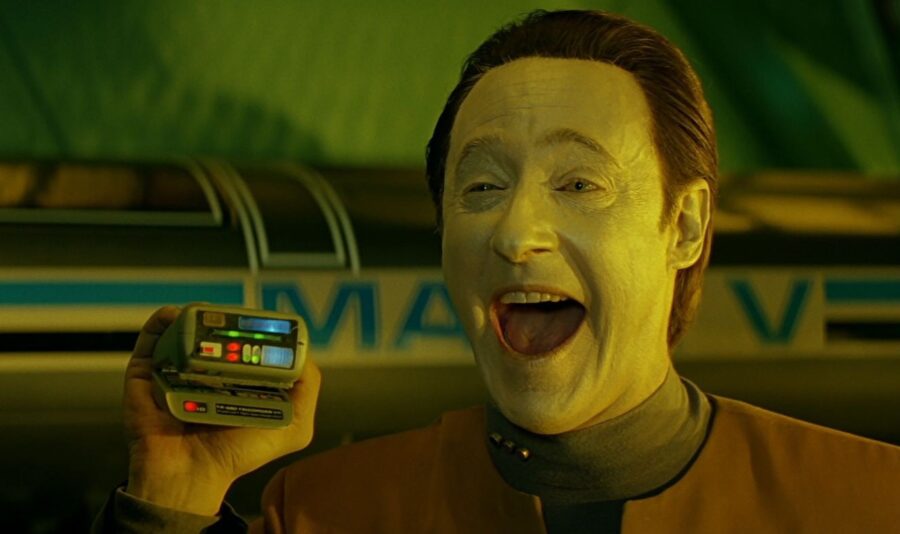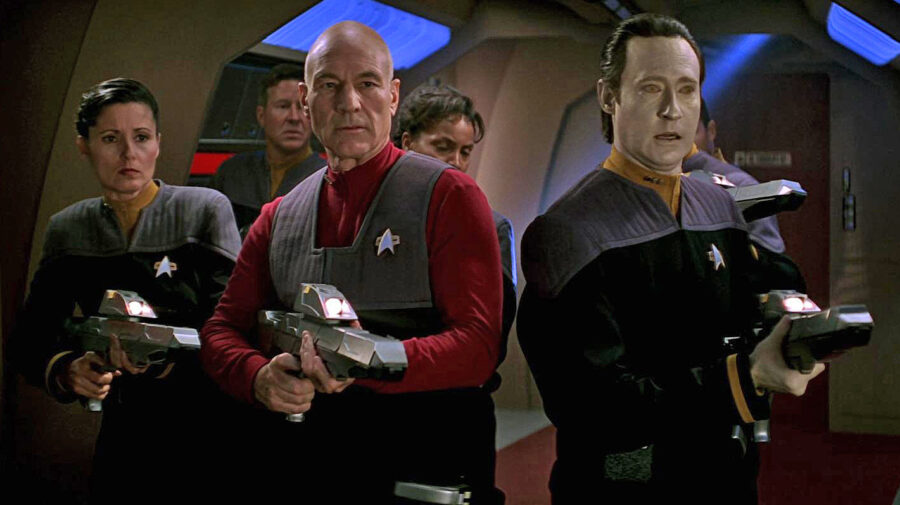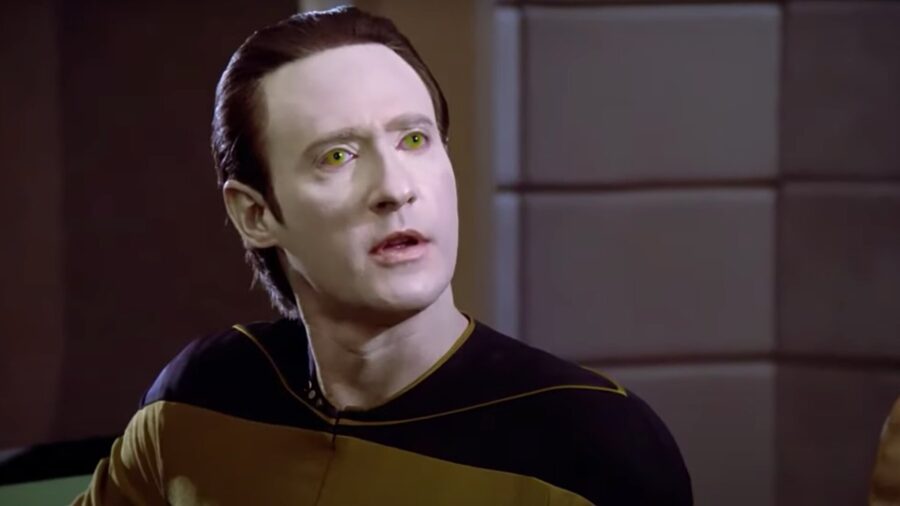How Star Trek: First Contact Ruined One Of Its Heroes
A great movie, but with a big flaw.

Opinions always differ, but generally speaking 1994’s Star Trek: Generations is considered one of the worst entries in Trek’s film franchise while its 1996 follow-up Star Trek: First Contact is hailed as one of the best. You’re not going to hear any differently here. By delivering a horribly unfitting death to James T. Kirk (William Shatner) while blatantly trying to replicate the emotional impact of the original Enterprise’s destruction from 1984’s Star Trek III: The Search for Spock, Generations earned all of the criticisms leveled against it. Likewise, by expertly pitting the TNG crew against the fan-favorite Borg while giving audiences the closest thing we’ve seen to a Trek horror film, First Contact deserved its accolades and its status as the highest-grossing Trek film before 2009’s Kelvin Timeline Star Trek. Ironically, in spite of its faults, Generations gave one of Trek’s heroes potential he’d never seen, and its follow-up scrubbed it all clean. That’s right–Star Trek: First Contact was the worst thing to happen to Lt Cmdr Data (Brent Spiner).
What Star Trek: Generations Got Right

Early in Generations, Data misreads a situation on the holodeck which puts him on less-than-friendly terms with Dr. Crusher (Gates McFadden). For the android, it’s the last straw–he decides there’s no way forward in his quest to become human unless he finally uses the emotion chip he took back from his “brother” Lore in TNG‘s final season. Geordi (LeVar Burton) agrees to help him integrate the chip, but ultimately things go sideways. Not used to emotions, Data has issues controlling his actions and when the chip becomes fused in his neural net he has no choice but to experience those feelings. When he and Geordi are attacked by Soran (Malcolm McDowell), the android is too scared to help his best friend. While subsequently aiding Captain Picard (Patrick Stewart) in his research, Data is too distressed to go on and requests to be relieved, even going so far as to yell at his commanding officer.
The new status quo for the character was a brilliant example of the old adage “be careful what you wish for.” While for years almost every single Data-centered episode revolved around the android hungering for emotions, the emotion chip created a promising new paradigm full of potential. Rather than an artificial intelligence striving to be more human, Brent Spiner‘s character became something as fascinating as it was dangerous: an artificial intelligence with the body of a superhuman, the mind of a futuristic super-computer, and the emotional stability of a toddler. Unfortunately, Star Trek: First Contact was on its way to wipe out all of that potential with a couple of lines and a twitch of the neck.
What Star Trek: First Contact Got Wrong

Early in Star Trek: First Contact, it seems that Data’s status quo from Generations remains the same. When the Borg once again attempt to invade Earth, Starfleet–afraid Picard’s trauma suffered at the Borg’s hands makes him unfit to face them again–orders the Enterprise to the Neutral Zone. When it becomes clear Starfleet is losing the fight, Picard orders the ship to Earth. Admitting that he’s violating their orders, the captain gives everyone on the bridge the opportunity to object. Data responds, “Captain, I believe I speak for everyone here, sir, when I say… to hell with our orders.” It’s a moment we’d never see from the old Data, and it’s clear the emotion chip is still active.
Then comes their journey back in time and the Borg’s infiltration of the Enterprise. When Picard, Data, and a squad of Starfleet’s best attempt an–ultimately failed–assault on Engineering, the android tells the captain he’s experiencing anxiety. Clearly shaken, Data begins describing the emotion, but Picard stops him with: “Data, I’m sure it’s fascinating experience, but perhaps you should deactivate your emotion chip for now.” That’s exactly what the android does with a little twitch of his neck. And so, just like that, Star Trek: First Contact erased all of the storytelling potential the emotion chip gave Data.
How Star Trek: First Contact Ruined Data

You might ask how Star Trek: First Contact giving Data the ability to turn his emotion chip on and off ruins its potential. It’s a fair question. The answer is that it takes all the stakes away from the new evolution of the character. Integrating the chip into Data was promising because it gave him new challenges — he might run away if scared, give in to temptation, react violently out of anger, or give in to emotions in any other number of ways. But if he can just turn his emotions on and off with no more difficulty than hitting a light switch? Then it’s no problem. The chip becomes nothing more than a way for Data to deliver funny lines like his improvised “scanning for lifeforms” song in Generations; or fan-service moments like his “to hell with our orders” in First Contact.
In fact, as much of a disservice as Star Trek: First Contact was to Data, 1998’s Star Trek: Insurrection made things worse. Early in the sequel when Picard learns that Data–who is away from the Enterprise on a special assignment–has gone rogue, he asks Geordi if it could be his emotion chip that caused him to malfunction. The engineer answers that Data “didn’t bring it with him.” He didn’t bring it with him?! It’s not even attached now? He can just shove it in a drawer like a set of car keys?
Star Trek: First Contact’s Worst Crime

More than for any other reason, the choice in Star Trek: First Contact to make the emotion chip something Data could just turn on and off was wrong because it went against his character. Data’s ultimate goal was to become more human, and humans cannot turn emotions on and off at will. For Data to experience emotions that he can instantly turn off renders those emotions useless in his quest. If your goal is to become more human, what’s the point of experiencing human emotions if they become optional? Emotions aren’t like extended warranties you have to pay extra for; they’re part of the package and they’re non-negotiable. Data would know that, and he’d act accordingly.












